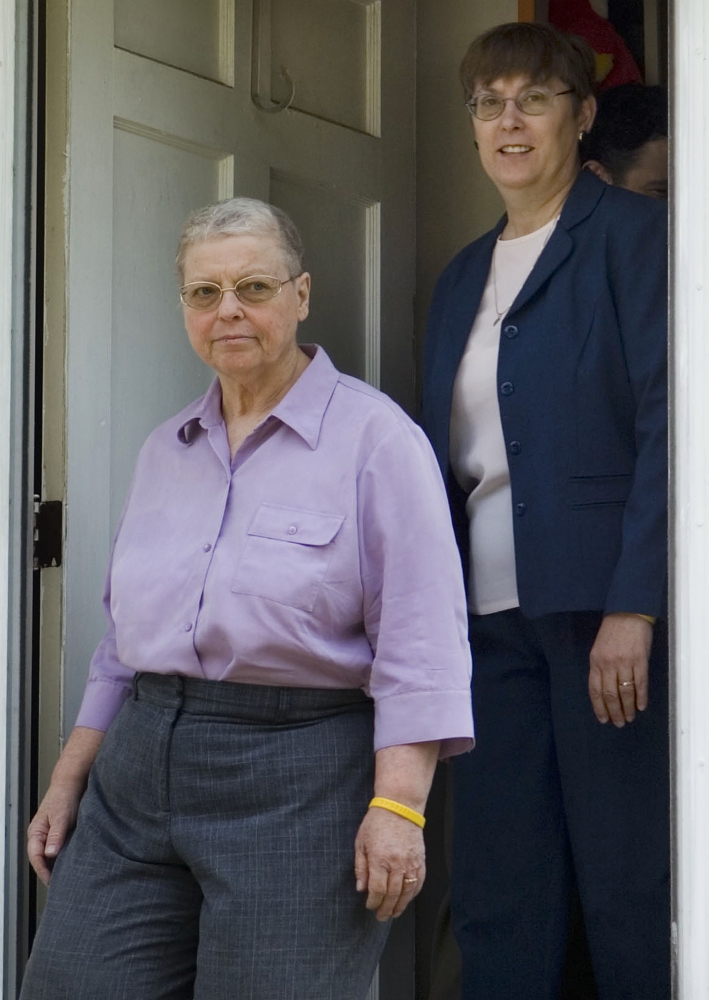HARTFORD, Conn. — A new Connecticut Supreme Court ruling is adding to the debate on whether gay marriage rights should be applied retroactively and qualify same-sex couples for rights and benefits for which they weren’t entitled before state laws allowed them to marry.
Although no states that allow gay marriage have made their laws retroactive, many same-sex partners believe they should have received Social Security survivor payments, tax breaks, inheritances and other benefits that once were afforded only to heterosexual married couples.
The Connecticut high court ruled unanimously Wednesday that a woman whose wife died amid a medical malpractice case may sue a doctor over the loss of her wife’s companionship and income, even though that right to sue was limited to heterosexual married couples at the time.
John Thomas, a Quinnipiac University law professor, believes the ruling opened a door to all kinds of new legal claims by same-sex couples seeking benefits and rights they weren’t entitled to before gay marriage laws were passed. If the U.S. Supreme Court ever declares gay marriage constitutional, he said, the legal floodgates would open.
“I think what the court recognized is that constitutional rights don’t spring into existence in one moment of time,” Thomas said. “I would expect to see a number of similar lawsuits in other states.”
Thomas and gay rights lawyers say the issue of retroactive gay marriage rights hasn’t made it to the nation’s courts yet for the most part, but they expect to see it spring up in states across the country. While the Connecticut court did not make its 2008 approval of gay marriage retroactive, it expanded common law to give gays and lesbians the right to sue over the death of a partner.
Same-sex marriage is now legal in 19 states and the District of Columbia.
The Connecticut case involved Margaret Mueller and Charlotte Stacey, who had a civil union in Connecticut in 2005 and got married in Massachusetts in 2008, shortly before Connecticut approved gay marriage.
Mueller was diagnosed with ovarian cancer in 2001. In 2005, however, Mueller and Stacey learned the diagnosis was wrong and she actually had appendix cancer. Mueller died in 2009 at age 62. Stacey said her death could have been prevented if the original diagnosis had been correct.
Mueller sued for malpractice. A jury issued a $2.4 million verdict in her favor against one of her doctors, while another doctor settled for an undisclosed amount. The trial court and the state Appellate Court, however, ruled against Stacey in her effort to sue a doctor for loss of spousal “consortium,” saying Stacey and Mueller weren’t married as required under the law at the time of the malpractice.
Massachusetts is the only other state where such a case was debated, legal experts say. That state’s highest court ruled in 2008 against a lesbian widow seeking to sue for loss of consortium, saying Massachusetts’ gay marriage law wasn’t retroactive and that a ruling in her favor “could open numbers of cases in all areas of law to the same argument.”
Send questions/comments to the editors.



Success. Please wait for the page to reload. If the page does not reload within 5 seconds, please refresh the page.
Enter your email and password to access comments.
Hi, to comment on stories you must . This profile is in addition to your subscription and website login.
Already have a commenting profile? .
Invalid username/password.
Please check your email to confirm and complete your registration.
Only subscribers are eligible to post comments. Please subscribe or login first for digital access. Here’s why.
Use the form below to reset your password. When you've submitted your account email, we will send an email with a reset code.